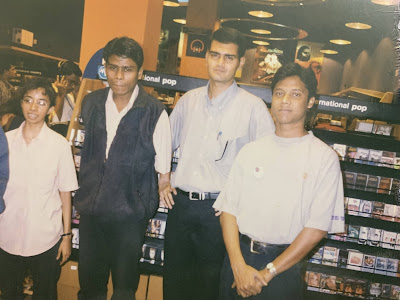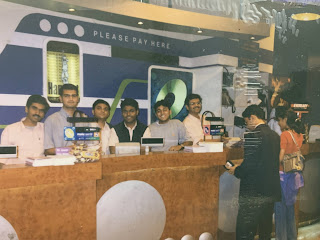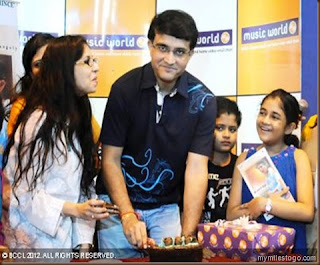I was almost in tears when I was informed that I have been posted in the Group’s HQ city as a Management Trainee for a year.
I walked in to the office of Ms. Latha Nambisan, the General Manager of Human Resources at the time and was almost in tears that this had happened to me among the 2 dozen MBA students who had joined the company, for I have not crossed the city’s borders even for a vacation (sic).
She gave me her warm, trademark smile as ever and said that this would be the best thing to happen to me in my career and that I wouldn’t regret. It was she, along with Mr. Dasharatharaman (Dash) and the late Retail legend Raghu Pillai, who recruited me after my MBA in Marketing from ITM Chennai.
She was right and her statements, true. I am deeply thankful to the Management at the eponymous RPG Group, which gave me this incredible opportunity so I could share my story one day.
The only solace for me then, was I could listen to music all day – for the retail format I would work for, sold cassettes and CDs across languages and genres.
After 3-weeks of corporate induction at Spencers Plaza in Chennai where RPG Retail was head quartered, I was put on the 2nd class coach of an a/c compartment – a first in my life – on Coromandel Mail to Kolkata, where I would join Musicworld as Assistant Manager from this day –25th June 2001.
When I reached the Howrah city Railway station in the wee hours, all I could smell was fish and shrimp, coupled with the unique smell of river Ganges which joins the sea here, ending her journey which begins in the Himalayas.
I couldn’t miss the buzz of a city where the majority is hardworking (though a few are hardly working!), as I traversed in a taxi crossing the famed Howrah Bridge and snaked through the narrow roads and bylanes laid by the British 100 years ago.
Since I had reached a day earlier of my date of joining, I decided to take a stroll down “Park Street”, the eponymous shopping destination in downtown Calcutta at the time. There, I met my Area Manager, Dipra Jha who, to my surprise was working on a Sunday!
I introduced myself to him and he welcomed me warmly to the city of joy and wished me a wonderful career in retail. He then showed me the section which had music from “Southern India” and asked me to redo the entire collection in 2-weeks.
When I formally joined the next day, I was treated with so much of warmth by my first boss and Area Manager Sanjeev Rao and the HR Manager, Partha Bhattacharya, who treated me for lunch at the city’s most famed Peter Cat restaurant, followed by pastries at Flurys.
Over the next 5-days (and the months I spent there), my colleagues – all locals, gave me the desired comfort for an outsider and guided me to find a small dwelling.
I chose to live independently at New Alipore. The country’s first Metro Rail ran in the city and the stations at my departure and arrival destinations where a 3-min walk.
I didn’t even have a basic kitchenette in my room but had a stereo system with 2-large speakers and a centre unit with a 3-disc player and could play 2 cassettes!
All I had taken to Calcutta were my beloved music system, a few clothes and 2 pairs of shoes. What I brought back was unforgettable memories, a few relationships that I still cherish and the man I became personally and the Retailer I would later become professionally. Of course, I learned conversational Bengali too…
I would travel across River Ganges to Belur Math and Dakshineshwar temple, to Kalighat temple, Birla Mandir and the Alipore Zoo during my off-days and sometime walk back 7kms to my home, from Park Street.
Every third day or so, the store would host music album releases and I had the opportunity to meet several celebrities during this period. Saurav Da was a frequent visitor. And so was our MD, Shri Sanjeev Goenka of the formerly unified RPG Group.
Food was an issue, being a vegetarian. But after sunset, I partied heavily at famed watering holes in town such as the London Pub, Someplace Else, Trincas, etc. with friends and acquaintances.
Since DJs would frequent my store to explore new music, I became their “beloved” guest at the Pub and would announce me on their hand mikes as an eligible and newest bachelor in town to the crowds at large, even as I would hide in embarrassment.
Along with local friends, I danced all night to drumbeats seeing off Goddess Durga to the sea after Navarathri, watched the horror of 9/11 that fateful day at a friend’s place having dinner, attended so many parties across the clubs of town and even travelled overnight to Siliguri where the second Musicworld store came up.
The 2002 New Year “rave” party was one to remember all my life. Enough said, I say!
Being a bachelor, I offered to my bosses that I can work on Sunday, so they could spend time with their families. This also meant, I could learn the retail business in detail, as most of the shopping would happen on a Sunday, especially post noon and the mostly in the evening.
Back in the day, Musicworld Park Street was the largest music store in Asia, spread over 7,000 sq ft in a single floor with a 18 ft ceiling, designed by globally renowned Fitch PLC and hosting listening pods on pillars by Japanese music giant Nakamishi.
The store would record monthly sales of INR 60 lakhs and above. We would sell 40,000 - 50,000 units of music cassettes and over 3,000 units of CDs a month, with an average selling price of INR 30 per cassette for Bengali and Hindi music, and INR 200 for CDs of Indian languages and INR 300 for western music.
During the month of December 2001, we recorded a monthly revenue of INR 96 lakhs, the highest ever done by the store in its history. By 2010, the music industry had moved away completely from hardware to digital and the last few MW stores were shut down as well.
But for this unplanned escapade to a town that I feared so much and the initial days of learning in grassroots retailing, I wouldn’t have been able to remain so firmly over the last 2.5 decades in the Industry. Dhonyobad Kolkata…
Celebrating our 11th year, I had launched the new website for my Business Advisory Firm Miles2Go Consulting Services on 14th April 2025 www.MilesToGo.in with an ambitious vision to file for an IPO in 2030 and to become the first Business Advisory Firm India too do so. Let’s see.



























